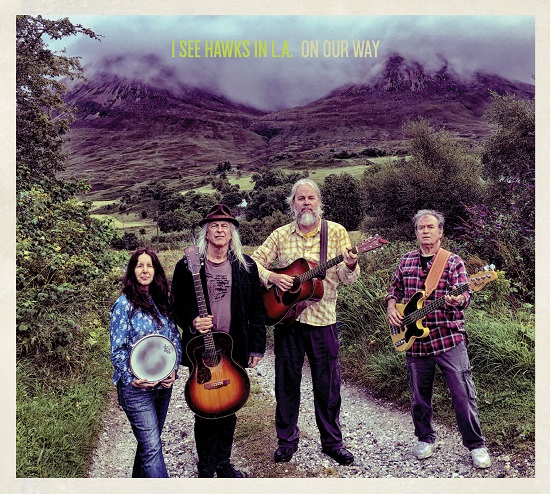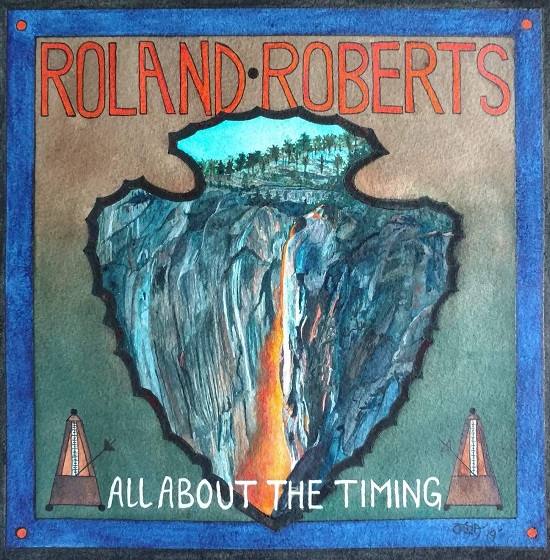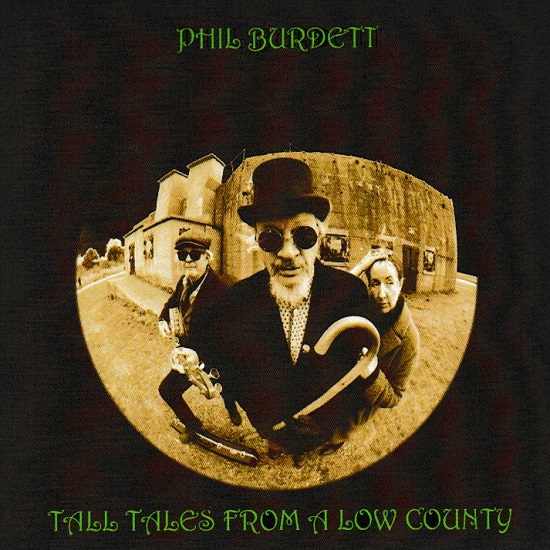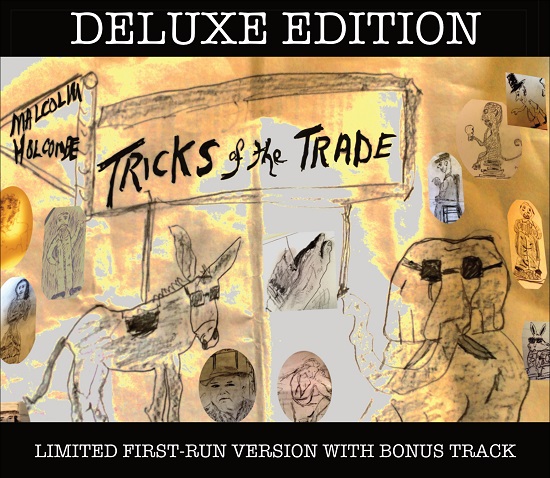
Where do I start with this one? The obvious I suppose; this is I See Hawks in LA’s lockdown album. This is the one where they discovered all of the ways of working that didn’t involve being in a room together, courtesy of Tim Berners-Lee. Rob Waller, Paul Lacques, Paul Marshall and Victoria Jacobs jumped in at the deep end and explored all the possibilities and opportunities on offer. The change in working methods and the broad church of Americana in the twenty-first century make “On Our Way” a very eclectic album indeed, incorporating elements of psychedelia, sixties pop and Southern swamp rock alongside the more usual country rock and string band arrangements. There’s a strong Byrds influence running through the whole album with twelve-string guitar featuring heavily and some gorgeous harmonies.
The album even has a pandemic song, the incredibly catchy and hook-filled “Radio Keeps Me on the Ground” which builds from an acoustic guitar intro, goes through the gears and finishes with the full band including Hammond B3. It’s an uplifting and optimistic look back at a particularly difficult year. The songs that move away from I See Hawks in LA mainstream are what gives the album its originality and depth. “Mississippi Gas Station Blues” is a grungy lo-fi, Canned Heat-inflected lope with a growling vocal, while “How You Gonna Know”, at over eight minutes long, is a constantly evolving take on a Tuareg chant with ambient sounds and general weirdness. “Know Just What to Do” is a heavily Byrds-influenced piece in triple time with chiming twelve-string and reversed guitar phrases. I’m not saying I’m endorsing this, folks, but these songs probably work better accompanied by some weed.
Victoria Jacobs gets her own song, as a writer and singer, on the album and it’s a little gem with a feel of sixties pop filtered by St Etienne. “Kensington Market” is about a visit to London in the eighties and has a dreamlike quality that works perfectly with Victoria’s vocal. There are a couple of interesting songs about historical figures; “Geronimo” tries to get inside the head of the Native American leader in later life, while “Kentucky Jesus” praises Muhammad Ali for his political and spiritual achievements rather than his boxing. Both are thought-provoking pieces.
“On Our Way” is a fascinating mix of mainstream Americana with psychedelia and a bit of grunge for good measure, topped off with Rob Waller’s mellow lead vocal and some lovely smooth harmonies. You certainly won’t be bored by this album.
“On Our Own Way” is out now on Western Seeds Record Company (WSRC – CD015).
Here’s the video for the title track:

This isn’t so much an obituary as an appreciation of a great player and arranger who didn’t necessarily get the credit from the public for everything that he put into the success of UB40. RIP Brian Travers.
Saturday February 16th 1980 was another one of those musical epiphanies. The university circuit was a crucial part of the plan to break new bands and Dundee University Students’ Association was part of that circuit. We booked acts that went on to be huge for ridiculous money (Tom Robinson Band at £250); I didn’t know how lucky I was until I graduated and didn’t have access to those gigs any more. This particular night was going to be good; we had The Pretenders headlining. They had already had three hit singles, including “Brass in Pocket” which went all the way to the top. I loved the album and couldn’t wait to see them, but I had a big surprise coming.
The Pretenders had a very black and white thing going on at that time (apart from Chrissie Hynde’s red leather jacket) and the overall vibe was studied cool. I’d heard the buzz about the support and was curious to hear them live. I’d been a fan of reggae and ska through my teenage years, but it was a whole new ball game when the UK-based bands started to break through, so UB40 looked interesting with double A-side single “King”/”Food for Thought” to be released imminently. From the opening seconds I was completely blown away.
The contrast with The Pretenders couldn’t have been greater. It was a laid-back and monochrome four-piece rock band against an eight-piece reggae band in riotous colour with a huge desire to succeed. UB40 really wanted it and they had political messages they wanted us to hear as well. There was something going on wherever you looked and you couldn’t take your eyes of the stage. Brian Travers was a player who defined the band’s sound, playing melodica (not unusual in reggae at the time) and tenor sax (a bit more unusual). “Food for Thought” was built around an incredibly catchy sax hook that you couldn’t ignore. I was instantly converted, bought the album “Signing Off” when it was released and the follow-up “Present Arms”, which had a harder musical and political edge. I even took a chance on trains over Christmas to go to a gig at Birmingham International Arena where the other acts on the bill were Elvis Costello, Rockpile, Squeeze, Madness and The Selecter. I saw the band a few more times over the years, including the 2010 “Signing Off” thirtieth anniversary tour, but I only really understood the importance of Brian Travers to the band when I photographed them at Cornbury Festival in 2018.
There were now two versions of UB40; this one was fronted by Duncan Campbell as singer. I know I’m not the only one to make this observation; this looked like a band that were taking the big payouts while they still could with phoned-in performances, with one exception. Brian Travers was on fire; he didn’t just play well, he was a showman who was working really hard to sell a package that was way past its sell-by date and mired in controversy and bitterness and just about succeeding. I didn’t envy him that job but he gave it everything. Brian Travers was still the livewire performer that I saw thirty-eight years earlier in Dundee; that’s how I’ll remember him.
He died on August 23rd after a long battle with cancer.

“All About the Timing” is Roland Roberts’ debut album. That came as a bit of a surprise, because there’s a self-assurance about the ten songs on offer (all Roland Roberts originals) that show experience and maturity not often found on first albums. If you want one word that sums up the album, it’s gentle. The musical arrangements, whether they’re string band, country or blues are uncluttered and unrushed, the humorous songs are gently humorous and even the politically-themed “Wake Up”, about America’s profit-driven healthcare system, is less a call to arms than a polite invitation to smell the coffee. And that’s why it hangs together so well; nothing’s forced or strained and everything is there for a reason.
Roland’s wanderings around the United States before settling in Alaska are reflected in his songs with references to Toronto, Colorado, Portland and Lincoln, Nebraska and musical stylings from across the North American continent. There’s even a couple of songs in triple time. The melancholy country song “Don’t Tell Me Goodbye” uses the time signature to emphasise the plaintive feel of the song (along with fiddle, harmonica and pedal steel), while the uptempo string band arrangement of “Keep Movin’ On” uses the triple time lilt to enhance the forward-looking message of the song.
Gentle humour plays an important part in the mix of “All About the Timing”. “Sittin’ in Nebraska” is a light-hearted take on John Fogerty’s “Lodi” theme of being stuck in Nowheresville, “Being Me” is a self-deprecatory piece with a reminder to be true to yourself and “Rambling Joe” is the story of someone taking that advice to its logical conclusion set against a string band arrangement with tight harmonies. “Picture on the Wall” takes a light-hearted look at growing up and growing away, picking up on a theme running through the album that we can’t ever stop moving. Among the other highlights of the album are “Lonely Blues”, featuring some lovely resonating Wurlitzer electric piano and the country rock of the title song with the simple message that, in life and relationships, however well we plan, our plans will be disrupted.
This is an album that’s easy on the ear, seducing the listener with subtle playing and arrangements before slipping in a surprise like the unexpected ending of the final song “Keep Movin On”:
‘Well your folks never liked me and I never knew why
I’d done nothing wrong, all I could do was try
So imagine my heartache when I found it was true
That the reason that they didn’t like me was you’
“All About the Timing” delivers the lyrical punches when you least expect them, contrasting the realities of life, particularly a musician’s life, with subtle and delicate stylings. It’s a contrast that works throughout the album, creating a piece of work that satisfies on musical and lyrical terms. You can’t argue with that.
“All About the Timing” is out now in the UK on Happy Life Records.
Here’s the video for the title track:

Here’s an interesting one. The Foreign Films is the nom de guerre of Canadian multi-instrumentalist and songwriter Bill Majoros. He’s been around for over two years and worked with some very well-known and influential artists. He’s probably the opposite of most of the artists we feature on Music Riot; his work isn’t about authenticity and roots, it’s unashamedly about creating gloriously uplifting, hummable and foot-tapping pop tunes in the same vein as The Feeling in the UK a few years ago or 10CC a few more years ago.
Bill Majoros is in a line of pop creators from Jeff Lynne, Pete Waterman, Guy Chambers and others who know how to steal a lick or a hook from somewhere and turn it in to their own creation. It’s not a criticism, all three of those songwriters have been incredibly successful commercially, creating pop masterpieces for themselves and other performers. There are many ways of creating songs and each one is acceptable when it’s judged by the results.
“Starlight Serenade” is the second album by The Foreign Films to be released in the pandemic and once again demonstrates the ability of artists to adapt to changes in circumstances. If you can’t bring musicians in, you play everything yourself and you use technology to create orchestras and choirs, which is exactly how “Starlight Serenade” was made. Most of the musical settings are fairly busy and a couple, “Angel in Disguise” and “Photograph of You”, have Spector-like Wall of Sound arrangements, while the rest of the album has its roots firmly in fifties/sixties/seventies classic pop. Sometimes it’s subtle hints and sometimes it’s complete pastiche like “The Mystery of Love” which is pure fifties/sixties doo-wop with piano triplets and almost falsetto lead vocal. If you think you can hear an influence, then you probably can. “All the Love You Give” hints at the sixties Honeybus classic “I Can’t Let Maggie Go” with the intro from The Fratellis’ “Chelsea Dagger”, “Many Moons Ago” is a nod towards The Stones’ “Ruby Tuesday” and “Rainbows” feels a lot like “Here Comes the Sun”.
“Starlight Serenade” is looking resolutely backwards to a couple of decades in the middle of the last century when pop songs were catchy, upbeat and full of hooks. It’s all about creating songs that are uplifting and, let’s be honest, we could all do with some of that at the moment. Listen and smile.
“Starlight Serenade” is out now on CURVE MUSIC (SNVY82).
Here’s the video from “All the Love You Give”:

Not so much of an album review as a dispatch from the front lines. Since his serious health difficulties five years ago, Phil Burdett’s become the prolific polymath of the Thames Estuary. He’s always been a singer-songwriter of the highest calibre as a live and recorded artist, but he’s broken out of those shackles since with 2016 by publishing and performing poetry, writing prose, directing film and doing some painting as well. The latest news is that he’s released “Tall Tales from a Low County”, a companion piece to last year’s “Folkmares” album with a similar theme of the East End Essex diaspora, the demographic transition from London’s dockland to the estuarial towns, old and new.
“Tall Tales from a Low County” features two long-term Phil Burdett collaborators, Steve Stott (playing fiddle, mandolin, banjo and ‘weird guitar’) and Colleen McCarthy (piano and vocals). Alongside Phil’s contributions on guitar (including, unusually, a bit of electric), programmed percussion, organ, accordion and some digital orchestration, they create soundscapes that match the meandering progress of the Thames and various points along its course. And you’re never too far away from some birdsong (or even seagulls) and tidal susurration along the way.
As with all of Phil Burdett’s albums, you can listen on a superficial level and thoroughly enjoy the experience, but the deeper you dig into the lyrics, the more satisfying it becomes. Phil puts the time into researching his themes; if you do the same you’ll enhance your experience of the entire piece, pulling together history, sociology and geography to tell some of the human stories of the river that made London and the south-east, from its meandering source to its meeting with the North Sea.
“Tall Tales…” opens with an ethereal exploration of London’s lost rivers, “Hush River Blind”, the arrangement conveying the menacing, claustrophobic atmosphere of subterranean rivers in culverts under England’s capital, all ultimately feeding out into the Thames on its journey to the estuary in the same way the songs broaden out to cover the lore of the river and the people that exist in a state of mutual dependence with it. I won’t force-feed you my opinions of every song (just take my word that they’re all good) but I will pick out some of my favourites.
The second song “Lighterman” has more space in its arrangement led by Phil’s chiming acoustic with the accordion (Phil again) and fiddle creating a sea shanty feel emphasised by Colleen and Phil’s layered backing vocals. The slow pace reflects the speed of the job done by the lightermen (now largely vanished), who moved the cargo from ships moored in the Thames to the shore (usually unpowered) before the heyday of the docks and their subsequent decline as a result of container ships. It’s a song in praise of people who did a highly skilled job using mainly the tides until a ‘better’ method evolved.
“Plotland Pioneers” is Phil Burdett at his very best, combining personal memories with social history in a slow country rock setting with a subtle combination of electric and acoustic guitars capturing a 1979 vibe perfectly, which is used as a narrative framework to timeshift back to the end of the nineteenth century, when land around Laindon that was uneconomical to farm was auctioned off in plots and bought mainly by people from the East End and developed as holiday or retirement homes. The infrastructure was non-existent (and don’t even ask about planning permission), but somehow the pioneers made it work until the area became part of the Basildon New Town project and was demolished from 1949 onwards. There’s even a reference to the companion album, “Folkmares”, slipped in there as well.
“Bow Bells, Shoebury Gun” is in the same mould, combining the progress of the river to the North Sea with a very personal spoken word memoir of childhood days in Basildon. It’s taken at a very leisurely pace as it drifts backward and forward in time and place, creating a haunting feel and a sense of displacement and exile. There might even be a slight nod in the direction of Leonard Cohen with the line: ‘Where are the cracks through which the sunlight shone now everything is gone?’ It’s a tour de force.
Almost everywhere you look on the lyric sheet (oh, the packaging’s superb as well, with stunning photography by Robert Shaw), there’s an interesting reference: Joseph Conrad, William Blake, the Great Dock Strike, the Crow Stone and London Stone (the Thames boundaries of the City of London) and so on. And could the line ‘The union’s gone and the chancer’s beer is tasteless’ be a reference to anyone other than Tim Martin? I do hope so. At a time when curmudgeonly old musicians are making songs in support of the anti-vaccine lobby and COVID deniers, maybe it’s time to listen to a songwriter that still has something interesting to say and an interesting way of saying it.
“Tall Tales from a Low County” is out now and you can show your support for a genuine British original by buying it here. Phil’s playing a gig to launch the album in St Mark the Evangelist Church, Southend on Saturday September 11th and I hope I’ll see you there.
And the rest of the news? Phil’s directorial film debut is ongoing (with cameo appearance from Wilko Johnson as a vicar) and the third album of Phil’s Cornish trilogy is now in pre-production with studio recording coming up fairly soon. He’s not hanging about.
Here’s a video clip for “Lighterman”:

Malcolm Holcombe is one of those songwriters who is quiet rightly revered by music fans and fellow-songwriters alike. He’s been releasing solo material for twenty-seven years now, and the quality of his work never dips; he just goes on writing, playing, beautifully crafted songs in his own country/blues/rock style, singing them in his own distinctive cracked drawl. It’s powerful stuff, even before you get to the lyrical themes of the of the twelve songs on this album (with a bonus thirteenth on the CD version).
Malcolm has been prolific recently with six albums in the last six years despite serious health problems and that small matter of a pandemic. “Tricks of the Trade” marks a progression from his recent work. The addition of electric guitar to Jared Tyler’s string armoury adds a harder cutting edge to the arrangements while Malcolm’s lyric have more of a political edge this time around, which shouldn’t surprise anyone after the events of the last eighteen months.
Musically the stylings move across the roots spectrum from the lap steel-led old country of “Misery Loves Company” through the uptempo acoustic “Crazy Man Blues” to the country rock of “Damn Rainy Day” (with a similar theme to Paolo Nutini’s “Pencil Full of Lead”). Jared Tyler’s electric adds some punch to the album’s closer “Shaky Ground”, while a cello line adds pathos to the love ballad “Lenora Cynthia” and “Higher Ground” has a pumping bassline that evokes the Talking Heads classic, “Psycho Killer”. It’s a strikingly broad musical palette.
The lyrical edge of the album comes, typically for Malcolm Holcombe, with the allusive and indirect political references, leaving the listener to wonder what they actually heard. Just two words in “Higher Ground”, ‘slumlord whitehouse’ convey the Trump genealogy. Donald Trump’s father Fred Trump built up the property empire that the former President inherited and was attacked in song by Woody Guthrie over racial discrimination. That’s a lot of meaning packed in to two words. And while we’re talking about presidents, “On Tennessee Land” highlights the short-sightedness of voters in the Southern states, recalling Lyndon B Johnson’s comment: ‘If you can convince the lowest white man he’s better than the best colored man, he won’t notice you’re picking his pocket.’ The title song can be interpreted as a commentary on political trickery or, like the opener “Money Train”, the machinations of the music business; there are always layers within layers in Malcolm Holcombe’s songs.
“Tricks of the Trade” is the real thing. Malcolm Holcombe has taken his very personal songwriting style in a more political direction while still retaining the subtlety of lyrical expression that typifies his work. Take the time to peel way the layers and you’ll find a very satisfying album that will stay with you.
“Tricks of the Trade” is released in the UK on Friday August 20th.
Here’s the video for the opening song “The Money Train”:


